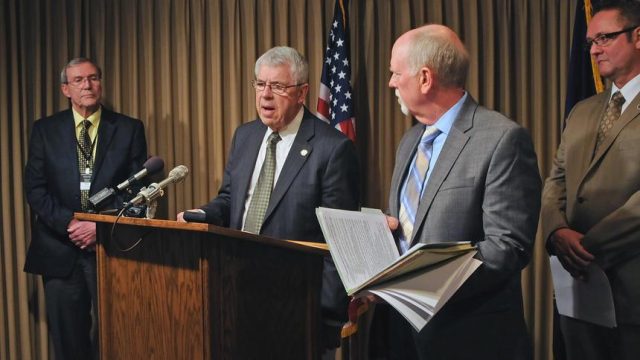Republican Legislative Leaders: We Balanced the Budget and Didn’t Raise Taxes

TOM STROMME.Tribune North Dakota Senate majority leader Sen. Rich Wardner (R-Dickinson), center, along with Sen. Dwight Cook (R-Mandan), left, and House majority leader Rep. Al Carlson (R-Fargo) and Rep. Craig Headland (R-Montpelier), back right, announce a bill to restructure the state's oil tax formula in the state capitol in Bismarck on Friday morning. "We have seen revenue projections decrease by nearly $5 billion since the Governor released his projections in December," said Sen. Wardner "The state needs predictable revenues and the industry needs a predictable tax structure long term, and this bill provides that certainty." Sen. Cook is the Senate finance and tax committee chairman and Rep. Headland is the House finance and tax committee chairman.
This guest post was submitted by House Majority Leader Al Carlson and Senate Majority Leader Rich Wardner
As the legislature leaves Bismarck, we are returning home with a balanced budget and no tax increases.
This session has proven the importance of exercising fiscal responsibility and saving for lean times. Despite facing one of the largest declines in revenue in state history, we were able to fund our priorities and balance our budget through a combination of smart reductions and using some reserves.
Early in the session, we passed legislation responding to the Dakota Access pipeline protests, focusing on the safety of our citizens and law enforcement. Months later, the pipeline has been completed and our state’s economy has seen an increase in oil and gas production.
[mks_pullquote align=”right” width=”300″ size=”24″ bg_color=”#ffffff” txt_color=”#000000″]Through the hard work of legislators from all across the state, we are leaving the Capitol with a positive framework for the future of our state.[/mks_pullquote]
We also responded to budget constraints with an inventive approach to making government more efficient. Legislators brought forward proposals to streamline state agencies and eliminate duplicative services, and we redoubled our efforts to use technology to simplify government services and save taxpayer money.
Our top priority, as always, was investing in our state’s greatest asset: our young people. Although most areas of state government were trimmed to balance the budget, we ensured that our students and teachers were not subject to those reductions. We also prioritized caring for our most vulnerable, restoring funding for long-term care that had been targeted for cuts.
We responded to North Dakota’s addiction crisis by increasing access to behavioral health services. We passed several criminal justice reform bills that go hand-in-hand with these behavioral health efforts. By rethinking punishments for lower-level offenses, we can steer people toward the treatment they need while fixing our prison overcrowding problem.
One of our major legislative accomplishments was the state takeover of county social services funding. This plan will eliminate 20 mills of levy authority in every county, resulting in permanent property tax reform. With this bill’s passage, the State of North Dakota is now contributing over $1.36 billion toward local property tax relief, or 39.1% of what would have been the responsibility of North Dakota property owners.
Through the hard work of legislators from all across the state, we are leaving the Capitol with a positive framework for the future of our state.




